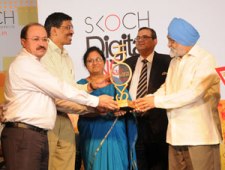|
|
|
|
|
Skip Navigation LinksHome ->Sucess Stories
|




|
|
SUCCESS STORIES OF TDIL
|
|
|
|
Indian Language Toolkit
|
|
To enhance the scope of Information Technology in the society requires availability of user-friendly tools and technologies in Indian Languages. This necessitated launching of the programs to accelerate development, awareness making available basic tools and technologies for mass usage at no cost to the users, support and encourage for production and interaction with applications in local Languages. With the aim to develop information processing tools to facilitate human machine interaction in Indian languages and to develop technologies to access multilingual knowledge resources, Department of Information Technology language CDs containing various software tools like Bharteeya Open Office, Open Type Fonts, Keyboard Drivers, Firefox Web Browser, E-mailing Client, etc have been released for free for public use for all 22 recognized Indian languages.
These software tools can also be downloaded from http://www.ildc.in. A typical Indian office is when enabled with these language CDs user are able to do word processing with dictionary & spell checker support, transliteration, convert storage code of the text file, create presentations and Spread sheets, store Indian language data in a database, send E-mail in own language, Surf web using localized web browser, create web content.
Further, the consolidated availability of linguistic resources and tools at one place will help researchers to carry out their research in a smooth and efficient manner.
 Skoch Digital Inclusion Award- 2011 : The prestigious “Skoch Digital Inclusion Award- 1st Sept. 2011” has been bestowed upon
TDIL Programme of DeitY for “National Roll Out Plan” Project in the category of “Technology
Intervention of National Importance” at a function presided over by Hon’ble MoS
MC&IT, Planning Commission Deputy Chairman and Secretary DIT besides other luminaries. This achievement
is a result of tireless efforts of TDIL team and CDAC Pune, GIST Group.
Skoch Digital Inclusion Award- 2011 : The prestigious “Skoch Digital Inclusion Award- 1st Sept. 2011” has been bestowed upon
TDIL Programme of DeitY for “National Roll Out Plan” Project in the category of “Technology
Intervention of National Importance” at a function presided over by Hon’ble MoS
MC&IT, Planning Commission Deputy Chairman and Secretary DIT besides other luminaries. This achievement
is a result of tireless efforts of TDIL team and CDAC Pune, GIST Group.
|
|
22 official Indian Languages in Unicode
|
|
Indic scripts form the most diversified and complicated script group in the world, and are the most difficult to handle with computers. Unicode Standard is a 16-bit storage encoding standard, which is being used internationally by the Industry for the development of Multilingual Software. Department of Information Technology (TDIL) is the voting member of the Unicode Consortium to ensure the adequate representation of Indic scripts in the Unicode Standards. Department of Information technology identified the required changes in the then Unicode Standard 3.0 for representation of Indian languages in the Unicode Standard. All the required changes have been accepted and incorporated in Unicode Standard version 5.1 and onward.
Recently, Sixty five characters have been recommended for inclusion in the Unicode Standard for representation of Vedic Sanskrit. Recently, Government of Manipur has been recommended for encoding for representation of Manipuri language in Meetei Mayek script. Similarly, ten characters have been recommended for encoding in the Devanagari block of the Unicode Standard for representation of Kashmiri in Devanagari script. With the encoding of characters for Kashmiri representation, the task of representation of all the 22 constitutionally in Unicode Standard is completed.
Current improvements in the implementation of Indian scripts based on the Unicode architecture have made the Indian languages available to all over the world. Further Information can be obtained from http://www.unicode.org.
|
|
|




|
| Website Last Updated on : 22 Apr 2022
|